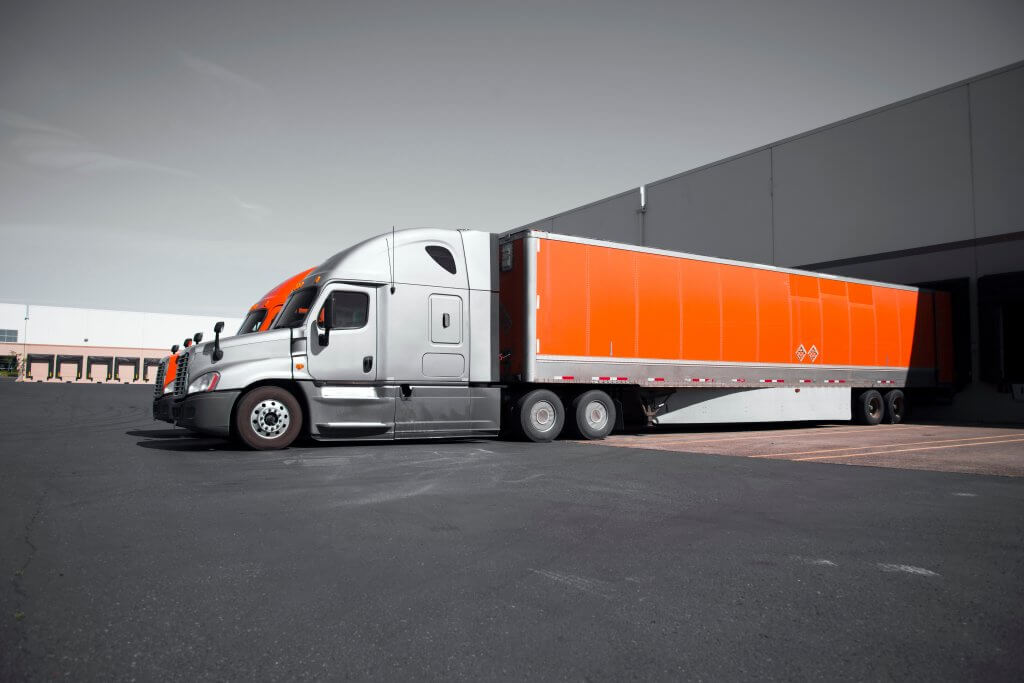It is important to keep your freight shipment costs as low as possible. But the cheapest freight costs aren’t always the best for everyone.
Sometimes, your freights are more suited to the volatile truckload shipping market. Other times, you need guaranteed capacity, regardless of the cost. As a result, there are two major pricing structures for truckload freight shipping; contract rates and spot rates.
This article describes the differences between spot rates and contract rates after it defines what each is. It then offers you a way to enjoy the best of both contract and spot rates with Total Connection.
What are Spot Rates?

Spot rate in truckload freight shipping is the current price for a freight shipment over a single lane at a single time. Because of the high volatility in the truckload market and how quickly the balance can shift between demand and supply for trucks, spot rates are usually unpredictable and volatile.
Spot rates reflect short-term pricing, heavily influenced by the supply and demand for trucks at the moment of the pricing. For instance, the spot rate goes up when there are more loads than trucks. But when there are more trucks than loads, the spot rate goes down.
Apart from supply and demand, other factors that affect spot rates are:
- The delivery time: Faster or urgent deliveries cost more.
- Backhaul availability: Carriers tend to charge more if there’s a low chance of securing a backhaul load from the delivery destination.
- Value of freight: More valuable loads attract higher rates.
- Weight of shipment: Heavier shipments are costlier to ship at the spot market.
- Freight shipping Requirements: HAZMAT shipments, for instance, cost more than nontoxic shipments because hazardous cargo often requires trained personnel and specialized equipment.
What Are Contract Rates?
Contract rates in truckload freight shipping are prices that a carrier and a shipper agree to ship cargo on a freight lane.
The parameters of this contract are often based on factors such as the projected volume of freight being shipped, shipping requirement for the freight, and the most recent spot rates. Other factors contributing to contract rates are the value of freight being shipped, lane, and shipment frequency.
This contact often lasts from a few months to one year. Although a shipper can negotiate for longer durations, carriers rarely want to commit to contracts where rates could get too far from spot rates. However, there’s always the option to renew the contract if both parties enjoy their partnership.
Contact rates are needed, most significantly, for the predictability and stability that they bring to the usually volatile truckload market.
Do Contract Rates Guarantee Capacity?

Most contract rate agreements allow shippers to secure capacity at a specific rate for their shipment for the contract duration, which is why they prefer it. This arrangement does not only benefit the shipper, as carriers like the idea of predictable revenue that contract rates provide.
Thanks to these guarantees and more, about 80% of the trucking market uses contract rates. Another reason the majority of the trucking industry sticks dearly to contract rates is that the contracts aren’t always binding. You can negotiate with your carrier at any time to adjust the rates.
However, there are instances where contract rates only lock in the price and not capacity. In other words, the carrier only agrees to transport freight at an agreed rate for the contract duration. But capacity is awarded on a first come first serve basis.
What Happens if a Party Breaks a Contract?
There are times when a party is forced to break a contract due to unforeseen circumstances. And while the goal of contract rates is to provide a scenario where the shipper and carrier go home happy, this is not always the case. And when contract breaches happen, some of the potential consequences include:
- Fines
- Lawsuits
- Dissatisfied partners, which may lead to a bad reputation for the shipper or carrier.
Sometimes, if the parties have had a good relationship in the past, an adjustment is just made to the contract, and things go smoothly.
Benefits of Contract Rates
Most shippers prefer contract rates to spot rates because they enjoy the following benefits:
- Better Planning and Budgeting
How easy can it be to plan and budget when your cargo shipment costs are all over the place? You don’t know if a pandemic scale event could happen next week, driving freight shipment costs to the roof. But with contract rates, you’ve got your plans and budget covered for the duration of your contract.
- Option to Build Strategic Carrier Relationships
The more a carrier works with a shipper, the stronger their partnership. And this could come in handy on many occasions for both parties.
For instance, a shipper may want a discount or quickly move some shipments up the timeline without resorting to the spot markets. Because both parties already have a productive work history and relationship, they are more likely to be able to work things out between themselves.
- Higher chances of securing capacity
While not all contracts guarantee capacity, most of them do. And as for those that don’t have guaranteed capacity, the carrier might be willing to work things around to help you secure capacity.
- Easier performance tracking
It also becomes easier to track your performance as a business when you have a stable cargo transport service. Contract rates ensure that your shipment costs are stable and that you can have an easier time calculating how your business is performing.
You’ll find more benefits of contract rates here:
Major Differences Between Contract Rates and Spot Rates
The major differences between contract rates and spot rates are:
- Duration
Contract rates often last from three months to a year. There may be several price readjustments between the carrier and the shipper during this time, depending on what’s going on in the spot market.
Spot rates, on the other hand, are for a specific shipment. Shippers on the spot rate market have to learn to negotiate the best rate for every shipment.
- Pricing
Most times, contract rates at a particular time are often higher than the spot rates for that same time. However, when you accumulate the contract rates over time, they are often lower than what spot rates would have cost you over the same time.
However, there are times when the spot rate is higher than the contract rate for that time. It all depends on what season we’re in and the dynamics between supply and demand at that moment.
- Volatility
Contract rates aim to protect shippers and carriers from the volatile world of truckload shipment. But this volatility is what spot rates expose them to, as the dynamics between demand and supply for capacity change.
- Coverage
Spot rates only cover a one-time shipment and nothing more. While offering their spot rate, the carrier considers the volume of shipment, the lane, backhaul chances, and truck to load ratio, among many others.
Contract rates, on the other hand, cover a specific lane. For instance, a carrier agrees to ship a particular volume of a particular commodity between two specific locations. If the need arises for the carrier to go through another lane for the shipper, adjustments have to be made, and appropriate compensations may follow.
- Performance Measurability
Measuring metrics, such as KPI performance, is easier with contract carriers than with spot carriers. And such metrics offer a shipper a performance overview of their supply chain, allowing them to know what to tweak to get it more efficiently.
- Who Benefits The Most
While both contract and spot rates are designed to benefit both parties as best as possible, the shipper is the party that benefits the most in a contract arrangement. This is because carriers are willing to offer stable rates for the possibility of long-term partnership and predictable revenue.
But where the carrier holds the longer end of the rope is in the spot market, where they mostly dictate how much to charge depending on the factors surrounding the shipment.
Which is Cheaper? Contract Rate of Spot Rate?
Contract rates are often lower in the long run. Because the truckload shipping market is very volatile, spot rates often see sharp spikes that could accumulate. Spot rates for urgent shipments can also add to the number. Contract rates, on the other hand, only change slowly over time.
That said, contract rates at a particular moment may be higher or lower than the spot rates at that same moment.
How Often are Contract Freight Rates Renewed?
Contract freight rates are often renewed, and a contract can last from a quarter to a year, depending on the shipper’s needs.
However, carriers don’t always want to get into contracts that last longer than a year because the market is volatile, and they don’t want to be left too far behind the current spot rates.
How Much Freight Volume Do You Need to Get Contract Rates?
The freight volume rarely has a significant bearing on whether or not you get contract rates. So, you don’t have to wait till your freight volume is “large enough” before considering contract rates.
However, you do need three essential things to secure contract rates. These three things would make it easier for you and the carrier to arrive at a mutually beneficial rate.
- A good estimate of your freight volume
- Consistent shipping lane
- Your timeframe
That said, contract rate should still not be your first option if your freight volume is very low. It just isn’t cost-effective.
Contract Rate Vs. Spot Rate: Which Is Better?
The better option between contract rates and spot rates is hugely dependent on the shipper.
For instance, if your shipment volumes are sporadic, spot rates may be better for you because you and your carrier may not find a contract rate that benefits you both. Also, if your company is not big enough to handle the costs of a contract rate, it may be better for you to stick to the spot market.
But on the flip side, if your company is big enough to outsource its freight transportation but not big enough to own its transport equipment, the contract market may be better.
And depending on your company’s needs, you may dedicate a portion of your shipment to contracts with carriers while leaving the rest to the spot market.
A business may have to rely on both contract and spot markets as the need arises. For instance, if a company uses spot freights, it is recommended to remain abreast of contract rates around you to see if you’re losing or gaining. And if you’re into contract rates, keep close tabs on the current spot market rates.
Secure the Best of Contract and Spot Rates with Total Connection
As a business, choosing between spot rates and contract rates ultimately comes down to which one best benefits you. This decision is not usually straightforward because there are just so many things that have to be factored into the decision.
Fortunately, Total Connection makes things very easy for you by offering you the best rates for the best services, regardless of whether it is spot or contract. In addition to that, we’re always willing to offer expert advice on which pricing structure best suits your freight and business.
You can contact us through the brief quote form below, and we’ll get back to you ASAP.
